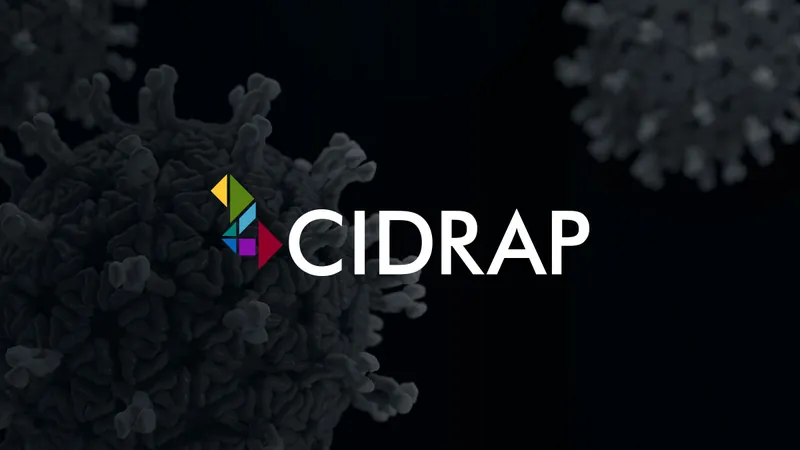
New Research Unveils the Surprising Connection Between Diet and Blood Cancers
2025-01-23
Author: Daniel
New Research Unveils the Surprising Connection Between Diet and Blood Cancers
Recent findings presented at the prestigious 2024 American Society of Hematology (ASH) Annual Meeting have unveiled a potentially groundbreaking link between dietary choices and the progression of hematologic malignancies, including multiple myeloma and graft vs. host disease (GVHD). Experts believe these studies may pave the way for dietary interventions that could fundamentally alter treatment strategies for individuals battling these cancers.
High-Fiber Diet May Slow Progression of Myeloma
Dr. Urvi A. Shah from Memorial Sloan Kettering Cancer Center shed light on the NUTRIVENTION study, which explored the effects of a high-fiber diet on patients diagnosed with monoclonal gammopathy of unknown significance (MGUS) and smoldering myeloma. The research involved 20 participants with a body mass index (BMI) over 25 kg/m², who followed a plant-based, high-fiber diet for 12 weeks, with meal delivery services facilitating adherence.
Results were promising: participants maintained a remarkable 91% adherence rate at 12 weeks, leading to a 7% reduction in BMI, which continued for up to a year. Additionally, positive changes were observed in several health markers, including insulin sensitivity and microbiome diversity. Significantly, two patients experienced disease stabilization – an outcome not typically demonstrated in previous intervention studies.
Follow-up studies are underway, with the next trial set to enroll 150 patients to provide further insights into the potential benefits of dietary changes in managing these conditions.
High Fiber Linked to Better Outcomes for Stem Cell Transplant Patients
At City of Hope National Medical Center, researchers found that patients undergoing allogeneic stem cell transplantation who consumed a high-fiber diet exhibited increased overall survival rates and a decreased incidence of GVHD. An extensive analysis of dietary habits included tracking over 35,000 meals across 173 patients. Researchers noted that higher fiber intake led to increased microbial diversity in the gut, which could play a significant role in enhancing patient resilience.
Jenny Paredes, PhD, emphasized that these findings indicate a strong correlation between dietary fiber consumption and improved health outcomes post-transplant, offering a clear strategy to combat the challenges of GVHD by fostering a healthy gut microbiome.
Ketogenic Diet Enhances CAR T-cell Therapy Efficacy
In another exciting study, researchers tested various diets in a preclinical model and discovered that a ketogenic diet significantly enhanced the effectiveness of CAR T-cell therapy. Mice on a ketogenic diet showed remarkable tumor control and longer survival rates compared to their counterparts on other diets. This was attributed to a compound known as β-hydroxybutyrate (BHB), which is a byproduct of fat metabolism and was found to boost the anti-tumor function of CAR T-cells.
The discovery has prompted researchers at the University of Pennsylvania to initiate a clinical trial for patients with non-Hodgkin lymphoma to explore BHB supplementation alongside conventional CAR T-cell therapy, aiming to further capitalize on its potential benefits.
Expert Perspectives on the Role of Diet in Cancer Care
In light of these findings, Dr. Ciara L. Freeman from Moffitt Cancer Center highlighted the significant role of gut health in both cancer prevention and recovery. She stated, "The studies underscore how dietary modifications, particularly those focusing on high-fiber, plant-based foods, could be essential components of effective cancer care." The implications are clear: small dietary changes could lead to substantial improvements in cancer management and patient outcomes.
These cutting-edge studies suggest a promising intersection between nutrition, cancer treatment, and preventive strategies—a hopeful notion for patients and healthcare providers alike in the ongoing fight against hematologic malignancies.




 Brasil (PT)
Brasil (PT)
 Canada (EN)
Canada (EN)
 Chile (ES)
Chile (ES)
 Česko (CS)
Česko (CS)
 대한민국 (KO)
대한민국 (KO)
 España (ES)
España (ES)
 France (FR)
France (FR)
 Hong Kong (EN)
Hong Kong (EN)
 Italia (IT)
Italia (IT)
 日本 (JA)
日本 (JA)
 Magyarország (HU)
Magyarország (HU)
 Norge (NO)
Norge (NO)
 Polska (PL)
Polska (PL)
 Schweiz (DE)
Schweiz (DE)
 Singapore (EN)
Singapore (EN)
 Sverige (SV)
Sverige (SV)
 Suomi (FI)
Suomi (FI)
 Türkiye (TR)
Türkiye (TR)
 الإمارات العربية المتحدة (AR)
الإمارات العربية المتحدة (AR)